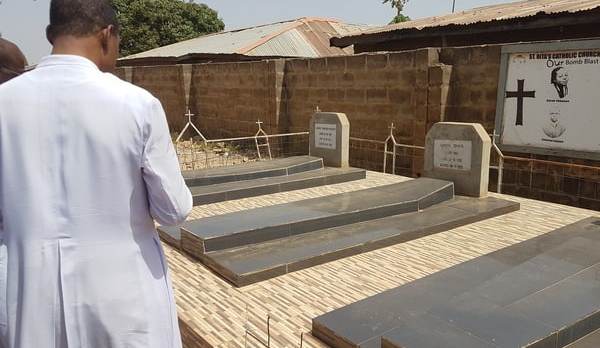Lenten Campaign 2025
This content is free of charge, as are all our articles.
Support us with a donation that is tax-deductible and enable us to continue to reach millions of readers.
The Bishop of Maiduguri in northeastern Nigeria has called for Catholics all over the world to pray the rosary to stop growing Islamist extremism in Africa. In a video message recorded for Aid to the Church in Need (ACN) to mark the launch of the Religious Freedom Report 2021, Bishop Oliver Dashe Doeme said: “For those who wish to help alongside aid organizations such as ACN, I ask that you pray for the end of violence, and pray particularly the rosary.”
The faithful in his diocese have been praying to the Mother of God for years. “Through fervid prayer and devotion to Our Lady, the enemy will certainly be defeated,” the bishop said. The Diocese of Maiduguri is one of the dioceses in Nigeria that is most severely suffering from the terrorist activities of Boko Haram.
The Islamist organizing Boko Haram has been terrorizing Nigeria for years. According to Bishop Doeme, up to 12,000 Christians in the country have been killed by terrorism since June 2015. However, Christians are not only being targeted by Boko Haram, they also suffer violent attacks by Islamic Fulani herdsmen, as well as by ISIS splinter groups such as ISWAP (Islamic State West African Province).
However, Muslims are also being targeted by the violence. “The Muslim council of the state of Adamawa, for example, has reported that 5,247 Muslims were killed by Boko Haram between 2013 and 2017,” said the bishop.
The violence stemming from Islamist extremism has spread far beyond the borders of Nigeria. “The Sahel region has become a safe haven for groups including Boko Haram that have pledged allegiance to the Islamic State.”
Chad, Mali, Niger, and a host of other countries are fighting the spread of extremism as well. Bishop Dashe explained: “Following the defeat of ISIS in Iraq and Syria, Africa has become the new epicenter of extremism. It will require international collaboration and the states of Africa working together to defeat the common enemy!”
According to ACN’s newly published Religious Freedom in the World Report 2021, Nigeria is still one of the countries in which Christians and Muslims are hardest hit by Islamist terrorism. According to the report, the UN estimates that two decades of Boko Haram-related violence have resulted in about 36,000 casualties and the displacement of two million people.
The International Committee of the Red Cross reported that half of the 40,000 people registered as missing in Africa were originally from the northeastern part of Nigeria, where Boko Haram is keeping the people in a constant state of terror. According to the report, Boko Haram’s objective is to overthrow the government and establish an Islamic state. However, Muslims are also not safe from the cruel violence of the extremists because the brutal attacks are being carried out in parts of the country where Muslims are in the majority and most Nigerian Muslims in Nigeria do not share the ideological fundamentalism of Boko Haram.
For several years, climate change and an ever-growing scarcity of grazing lands have led to an increase in the number of reported attacks carried out by Fulani herdsmen, who have particularly targeted Christians. According to the Religious Freedom Report, these attacks are increasingly showing radical Islamist tendencies.
The report found that large parts of Africa are becoming the focus of transnational jihadist networks such as ISIS and al Qaeda. These networks are joining forces with local armed militia groups and—backed by the ideological and material support from ISIS and Al Qaeda leadership in the Middle East—are fostering their radicalization in order to set up “provinces of the caliphate” along the Equator; there is a crescent of jihadist violence which today extends all the way from Mali to Mozambique in Sub-Saharan Africa.
For a video of Bishop Doeme’s testimony, please click
ACN’s 2021 Religious Freedom in the World Report can be found here.
This article was first published by Aid to the Church in Need and is republished here with kind permission. To learn more about ACN’s mission to help the suffering Church, visit www.churchinneed.org

